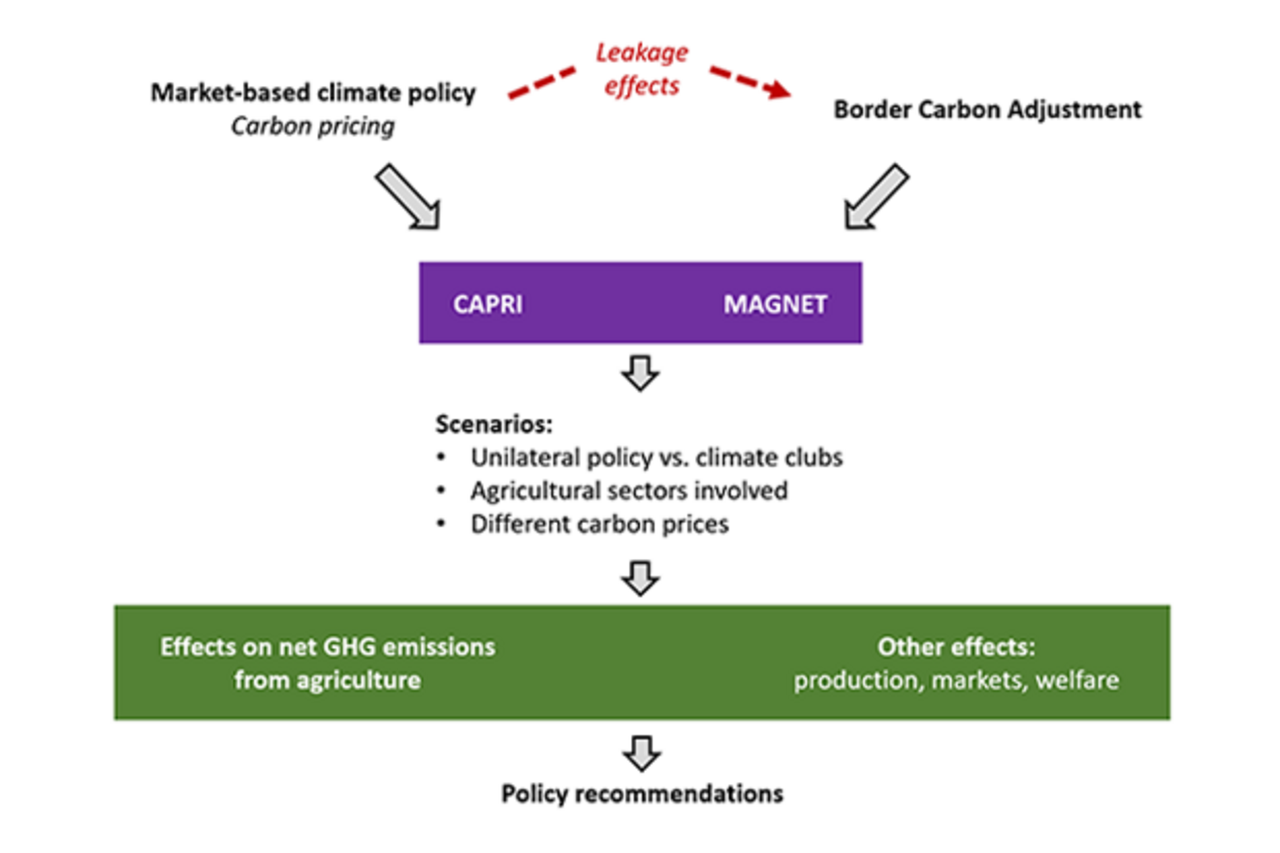Project
Long-term climate mitigation policies for the agri-food sector

Long-term climate mitigation policies for the agri-food sector
The European Green Deal and the Farm-to-Fork strategies highlight the importance of market-based instruments to alleviate climate change. A quantitative assessment of different instruments is crucial for successful climate policies.
Background and Objective
Agriculture is not only a victim of climate change, but can also contribute to climate mitigation. On the one hand, greenhouse gas emissions from agriculture could be substantially reduced; on the other hand, agriculture could play an essential role in carbon sequestration. Yet, what market-based instruments are required to facilitate both processes? And what implications do these instruments have on production, trade, welfare and carbon leakage? This project aims to provide a quantitative assessment of alternative instruments to ensure the successful and cost-effective implementation of climate-protecting strategies in agriculture.
Target Group
Policymakers, researchers, agricultural advisors, chambers of agriculture, interested professional and general public
Approach
The project will address market-based instruments for protecting climate from different perspectives, elaborated within three subprojects:
- Subproject A (led by Alisa Spiegel, Coordination Unit Climate) will coordinate the project, identify implementation paths, and summarize the main results for policy advice.
This subproject brings together the analyses and results of all subprojects and other related activities at Thuenen Institute. The aim is to evaluate climate protection measures and strategies with regard to further development of the German agricultural climate protection policy and transformation paths up to 2050, as well as to evaluate concrete policy advices. Furthermore, the subproject aims to develop methodical basis for emission projection reports and test its practical implementation. Climate-protecting measures planned by the German government will be quantified and projected into the future, considering different long-term scenarios up to 2050.
- Subproject B (led by Davit Stepanyan, Institute of Farm Economics) will focus on quantitative assessment of diverse climate-protecting strategies with the CAPRI model.
This subproject consists of three consecutive phases. First of all, a new baseline for CAPRI will be developed until 2050 that also accounts for the Green Deal measures. This phase assumes quantifying the shared socio-economic pathways (SSPs) for European agriculture and food systems. During the second phase of the project, the CO2 and non-CO2 emissions by the GHG module of CAPRI will be validated using the German GHG reporting in the base year in coordination with Coordination Unit Climate. Throughout this process, the results calculated by the CAPRI GHG module will also be compared to the results obtained by the MAGNET model and if necessary the CAPRI GHG module will be adjusted and improved accordingly. In the final phase, different CO2 pricing policies will be implemented and evaluated in the CAPRI model. In coordination with Coordination Unit Climate and Institute of Market Analysis, common scenarios for the transformation paths and the target year 2050 will be formulated.
- Subproject C (led by Julio G. Fournier Gabela, Institute of Market Analysis) will carry out a quantitative assessment of trade instruments with the MAGNET model.
Given that the European Union is the world's largest exporter and importer of agri-food products and, at the same time, a net importer of related GHG emissions, its inclusion into a border carbon adjustment (BCA) system can exert certain leverage in reducing emissions. The possibility of taxing embodied CO2 emissions in international trade to prevent carbon leakage has long been the subject of political and scientific debate. Despite legal and practical hurdles, the European Union is currently considering implementing BCAs to support the Green Deal initiative. However, all available BCA proposals target climate policies directed at the energy sector. This project aims to develop concrete options for a BCA system for agri-food products and assess the consequences of their implementation and contribution towards reducing carbon leakage due to future unilateral climate policy in this sector. For this purpose, different BCA options will be implemented in MAGNET, a computable general equilibrium (CGE) model with a focus on agricultural markets and international trade.
Preliminary Results
Focusing on preselected market-based instruments to protect climate, the project will provide a quantitative assessment of the alternatives not only with respect to their effects on greenhouse gas emission, but also with respect to their effects on production, markets, and welfare. Furthermore, the results obtained with the CAPRI and MAGNET models will be developed into concrete implementation paths.
Thünen-Contact

Involved Thünen-Partners
- Banse, MartinMA Institute of Market Analysis
- Fournier Gabela, JulioMA Institute of Market Analysis
- Freund, FlorianMA Institute of Market Analysis
- Gocht, AlexanderBW Institute of Farm Economics
- Osterburg, BernhardKB Coordination Unit Climate, Soil, Biodiversity
- Rieger, JörgBW Institute of Farm Economics
- Söder, MareikeKB Coordination Unit Climate, Soil, Biodiversity
- Spiegel, AlisaKB Coordination Unit Climate, Soil, Biodiversity
- Stepanyan, DavitBW Institute of Farm Economics
Duration
1.2021 - 4.2025
More Information
Project status:
ongoing
Publications to the project
- 0
Spiegel A, Heidecke C, Osterburg B (2025) Distance to climate targets in agriculture in the EU. Q Open 5(1):qoae018, DOI:10.1093/qopen/qoae018
- 1
Spiegel A, Heidecke C, Rommel J, Matthews A (2025) Unravelling complexity of policies for climate change mitigation in agriculture. Q Open 5(1):qoaf007, DOI:10.1093/qopen/qoaf007
- 2
Fournier Gabela JG, Spiegel A, Stepanyan D, Freund F, Banse M, Gocht A, Söder M, Heidecke C, Osterburg B, Matthews A (2024) Carbon leakage in agriculture: when can a carbon border adjustment mechanism help? Climate Pol 24(10):1410-1425, DOI:10.1080/14693062.2024.2387237
- 3
Spiegel A, Heidecke C, Fournier Gabela JG, Stepanyan D, Söder M, Freund F, Gocht A, Banse M, Osterburg B (2024) Climate change mitigation in agriculture beyond 2030: Options for carbon pricing and carbon border adjustment mechanisms. EuroChoices 23(1):19-27, DOI:10.1111/1746-692X.12425
- 4
Fournier Gabela JG, Bickert C (2023) "Ein Ausgleich der CO2-Kosten für Agrarexporte wäre extrem komplex". DLG Mitt(10):65
- 5
Stepanyan D, Heidecke C, Osterburg B, Gocht A (2023) Impacts of national vs European carbon pricing on agriculture. Environ Res Lett 18(7):074016, DOI:10.1088/1748-9326/acdcac
- 6
Fournier Gabela JG, Freund F (2023) Potential carbon leakage risk: a cross-sector cross-country assessment in the OECD area. Clim Change 176(5):65, DOI:10.1007/s10584-023-03544-x






